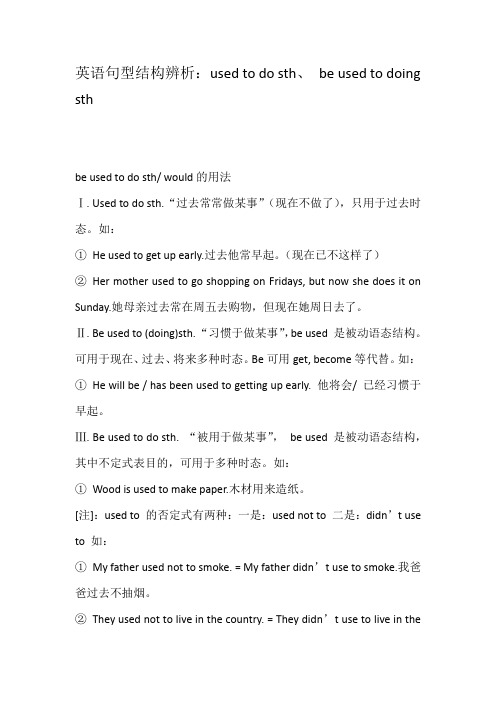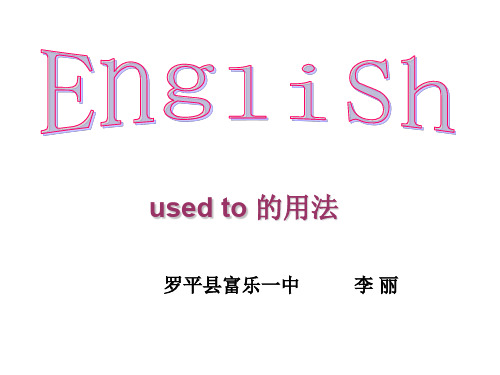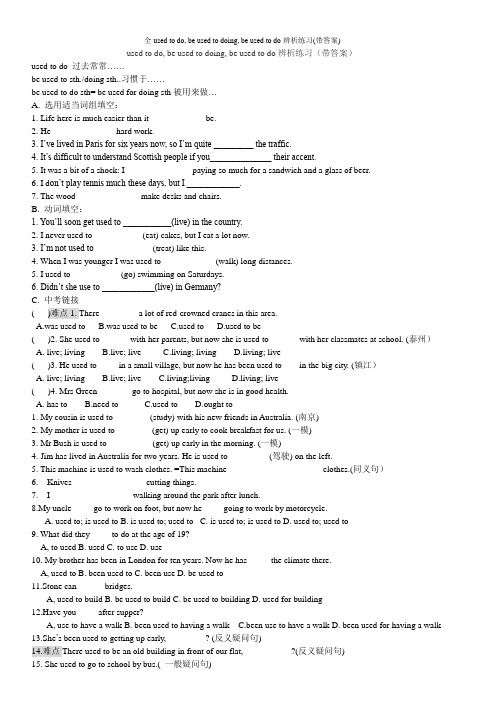辨析be to do
used_to_do__be_used_to_doing__be_used_to_do辨析

used to do, be used to doing, be used to do辨析used to do 过去常常……be/get used to sth./doing sth.. 习惯于……be used to do 被用来做……(1) used to do sth. 过去常常……(现在已不如此)We used to grow beautiful roses.注意:否定句和疑问句有两种You usedn’t to make that mistake.She didn't use to do it, did she?You used to smoke a pipe, didn't you? / used n't you?【区别】(2) be / get / become used to + n. / doing 习惯于I have always been used to hard work.He got used to living in the country.(3) be used to do 被用来做……This knife is used to cut bread.表示“过去常常……”时,used to与would区别:(1) would 只强调“过去常常……”,used to 说明现在不是如此。
The old woman would sit there for hours doing nothing.(2) would 只接行为动词,used to 可接行为动词和表状态的词。
如:be, like, know, have。
There used to be a temple at the foot of the mountain.A. 选用适当的词组填空:1. Life here is much easier than it ____________ be.2. He ______________ hard work.3. I’ve lived in Paris for six years now, so I’m quite _________ the traffic.4. It’s difficult to understand Scottish people if you______________ their accent.5. It was a bit of a shock: I___________________ paying so much for a sandwich and a glass of beer.6. I don’t play tennis much these days, but I ____________.7. The wood ______________ make desks and chairs.B. 动词填空:1. You’ll soon get used to ___________(liv e) in the country.2. I never used to ___________(eat) cakes, but I eat a lot now.3. I’m not used to _____________(treat) like this.4. When I was younger I was used to ____________(walk) long distances.5. I used to ___________(go) swimming on Saturdays.6. Didn’t she use to ____________(live) in Germany?C. 翻译句子:1.几个月后他就习惯了一个人生活了。
高中英语词语辨析be about to,be to do,be going to

高中英语词语辨析be about to,be to do,be
going to
都可用来表示"将要做某事,但含义和用法有所不同。
be about to 从时间上来讲,等于be just going to do,意思是"即将,马上就要去做"。
因此,在由这个短语构成的句子中,一般不可再加上表示时间的状语(如at once, next)
例如:I am about to leave for Shanghai.我将要去上海。
be to do主要表示安排或计划要在将来做的事情,它还可以表示命令等语气,相当于should, must 等。
它可以同将来的时间状语连用。
例如:The US President Bill Clinton is to visit Japan next week.美国总统比尔?克林顿将于下周访日。
The letter is to be handed to him in person.这封信必须面交他本人。
be going to do 一般可以和be to do 换用,它在通常情况下表示计划,安排或准备去做某事的意向,但并不一定马上去做。
它一般都与时间状语连用;此外,它还可以用来表示某种推断或可能性。
例如:What are you going to do for your holiday?假期有什么打算吗?It's going to rain soon, look at those black clouds.看那些乌云,快要下雨了。
英语句型结构辨析:used to do sth、 be used to doing sth

英语句型结构辨析:used to do sth、be used to doing sthbe used to do sth/ would的用法Ⅰ. Used to do sth.“过去常常做某事”(现在不做了),只用于过去时态。
如:①He used to get up early.过去他常早起。
(现在已不这样了)②Her mother used to go shopping on Fridays, but now she does it on Sunday.她母亲过去常在周五去购物,但现在她周日去了。
Ⅱ. Be used to (doing)sth. “习惯于做某事”,be used 是被动语态结构。
可用于现在、过去、将来多种时态。
Be可用get, become等代替。
如:①He will be / has been used to getting up early. 他将会/ 已经习惯于早起。
Ⅲ. Be used to do sth. “被用于做某事”,be used 是被动语态结构,其中不定式表目的,可用于多种时态。
如:①Wood is used to make paper.木材用来造纸。
[注]:used to 的否定式有两种:一是:used not to 二是:didn’t use to 如:①My father used not to smoke. = My father didn’t use to smoke.我爸爸过去不抽烟。
②They used not to live in the country. = They didn’t use to live in thecountry.其疑问式是将used 提前,或添加助动词did.Ⅳ.would 是情态动词,没有象used to那样,有过去和现在的对比。
不能说明是否现在还做不做。
辨析used_to_be_used_to_do_sth_be_used_to_doing_sth

I used to get up early. I am used to getting up early.
I used to travel by air. I am used to traveling by air.
The robot can be used to do some dangerous work.
• B. 动词填空: 1. You’ll soon get used to ____l_iv_in_g____(live) in the country. 2. I never used to ____e_a_t _____(eat) cakes, but I eat a lot now. 3. The knife is used ___to__cu_t_(cut) things.
=Used he to be short?
used to ; get(be) used to与be used to do
ed to “过去常常,过去经常”,只用于过去时, to 后要接动词原形. 2.be used to …(get used to …) “习惯于”, 可用于任 何时态,该短语中的 to 为介词,后跟名词或动名词。 3. be used to do “被用来做…”,常用于被动语态中. used 是动词use的过去分词.
初中英语词汇辨析

1. have to /must(1)have to和must 都可以用来谈论义务,但用法略有不同。
如果某人主观上觉得必须去做而又想去时,常用must。
如果谈论某种来自“外界”的义务,常用have to。
例如:I must stop smoking. 我必须戒烟。
(自己想戒烟)They have to work for the boss.他们不得不为那个老板工作。
(条件逼得他们去工作)(2)have to 可用于多种时态,must 只能用于一般现在时。
例如:I’ll have to get up early tomorrow morning.明天早晨我必须早早起床。
We had to work long hours every day in order to get more money.为了多挣钱,我们不得不每天长时间地工作。
(3)用于否定句时,mustn’t意思是“决不能”,“禁止”,而don’thave to意思是“不必”,相当于needn’t。
例如:Y ou mustn’t be late again next time.下一次你决不能再迟到。
Y ou don’t have to go there today. Y ou can go there tomorrow.你今天不必到那里去了。
你可以明天去。
2. above/ over/ on这三个介词都表示“在……之上”,但含义不同。
on指在某物的表面上,和某物接触;above指在某物的上方,不和某物接触,但也不一定在某物的正上方;over指在某物的正上方,不和某物接触。
试比较:There is a book on the desk.课桌上有一本书。
I raise my right hand above my head. 我把右手高举过头。
There is a stone bridge over the river. 河面上有座石桥。
3. forget to do sth./forget doing sth.forget to do sth.意思是“忘记做某事”,实际上还没做;forget doing sth,意思是“忘记做过某事”,实际上已经做过了。
全used to do, be used to doing, be used to do辨析练习(带答案)

used to do, be used to doing, be used to do辨析练习(带答案)used to do 过去常常……be used to sth./doing sth..习惯于……be used to do sth= be used for doing sth被用来做…A. 选用适当词组填空:1. Life here is much easier than it ____________ be.2. He ______________ hard work.3. I’ve lived in Paris for six years now, so I’m quite _________ the traffic.4. It’s difficult to understand Scottish people if you______________ their accent.5. It was a bit of a shock: I_______________ paying so much for a sandwich and a glass of beer.6. I d on’t play tennis much these days, but I ____________.7. The wood ______________ make desks and chairs.B. 动词填空:1. You’ll soon get used to ___________(live) in the country.2. I never used to ___________(eat) cakes, but I eat a lot now.3. I’m not used to _____________(treat) like this.4. When I was younger I was used to ____________(walk) long distances.5. I used to ___________(go) swimming on Saturdays.6. Didn’t she use to ____________(live) in Germany?C. 中考链接( )难点1. There ________ a lot of red-crowned cranes in this area.A.was used toB.was used to beed toed to be( )2. She used to ______ with her parents, but now she is used to ______ with her classmates at school. (泰州)A. live; living B.live; live C.living; living D.living; live( )3. He used to ____ in a small village, but now he has been used to ___ in the big city. (镇江)A. live; livingB.live; liveC.living;livingD.living; live( )4. Mrs Green _______ go to hospital, but now she is in good health.A. has toB.need toed toD.ought to1. My cousin is used to ________(study) with his new friends in Australia. (南京)2. My mother is used to ________(get) up early to cook breakfast for us. (一模)3. Mr Bush is used to __________(get) up early in the morning. (一模)4. Jim has lived in Australia for two years. He is used to _________(驾驶) on the left.5. This machine is used to wash clothes. =This machine _____________________ clothes.(同义句)6. Knives ________________ cutting things.7. I __________________ walking around the park after lunch.8.My uncle ____ go to work on foot, but now he ____ going to work by motorcycle.A. used to; is used toB. is used to; used toC. is used to; is used toD. used to; used to9. What did they ____ to do at the age of 19?A, to used B. used C. to use D. use10. My brother has been in London for ten years. Now he has ____ the climate there.A, used to B. been used to C. been use D. be used to11.Stone can ____ bridges.A, used to build B. be used to build C. be used to building D. used for building12.Have you ____ after supper?A, use to have a walk B. been used to having a walk C.been use to have a walk D. been used for having a walk13.She’s been used to getting up early, ____ ____? (反义疑问句)14.难点There used to be an old building in front of our flat, ____ ____ ?(反义疑问句)15. She used to go to school by bus.( 一般疑问句)______________________________________________________16.Mary used to have milk and bread for breakfast, ____ ?ed she B. doesn’t she C. did she D. didn’t she相关拓展(初中学生了解即可,不要求运用)used to 正式否定形式为usedn’t 疑问形式为used提前。
高中英语常见20组词汇、词义及用法辨析

高中英语常见20组词汇、词义及用法辨析高中英语常见20组词汇、词义及用法辨析到濮阳:在做英语试题的时候,你是否经常遇到这样的情况:几个选项,词义意思相近,似乎选哪一组都是正确的,让你很是纠结,无所适从。
今天小编就给同学们整理高中阶段常见的二十组词义相近的单词用法辨析,解决困扰你的问题!1.accuse / chargeuse 和charge都有“指责,控告”之意,有时可通用,但结构不一样。
accuse不一定针对重大过失或罪行,其结构为accuse sb of sth。
而charge一般用于重大过失或罪行,其结构为charge sb with sth,此结构还有“使某人负有……责任”之意。
例如:例1:My father accused me of my being too careless. (父亲责备我太粗心。
)例2:He accused me of neglecting my duty. (他指控我玩忽职守。
)例3:He charged me with neglecting my duty. (同上)例4:Jimmy was charged with murder. (吉米被控谋杀。
)例5:He was charged with an important task. (他担负有一项重要任务。
)2.add / add to / add up / add up toadd:增加,把……加上。
add…to…:把……加到。
例如:例6:At the end of the party, we added another program.例7:You n eedn’t add any water to the medicine.add to:增添。
指增添喜悦、悲伤、麻烦等。
例如:例8:His coming added to our trouble. (他的到来给我们添了麻烦。
)add up:加起来。
例如:例9:Have you added up all the numbers?add up to:总计。
全used to do, be used to doing, be used to do辨析练习(带答案)

used to do, be used to doing, be used to do辨析练习(带答案)used to do 过去常常……be used to sth./doing sth..习惯于……be used to do sth= be used for doing sth被用来做…A. 选用适当的词组填空:1. Life here is much easier than it ____________ be.2. He ______________ hard work.3. I’ve lived in Paris for six years now, so I’m quite _________ the traffic.4. It’s difficult to understand Scottish people if you______________ their accent.5. It was a bit of a shock: I_______________ paying so much for a sandwich and a glass of beer.6. I don’t play tennis much these days, but I ____________.7. The wood ______________ make desks and chairs.B. 动词填空:1. You’ll soon get used to ___________(live) in the country.2. I never used to ___________(eat) cakes, but I eat a lot now.3. I’m not used t o _____________(treat) like this.4. When I was younger I was used to ____________(walk) long distances.5. I used to ___________(go) swimming on Saturdays.6. Didn’t she use to ____________(live) in Germany?C. 中考链接( )难点1. There ________ a lot of red-crowned cranes in this area.A.was used toB.was used to beed toed to be( )2. She used to ______ with her parents, but now she is used to ______ with her classmates at school. (泰州)A. live; living B.live; live C.living; living D.living; live( )3. He used to ____ in a small village, but now he has been used to ___ in the big city. (镇江)A. live; livingB.live; liveC.living;livingD.living; live( )4. Mrs Green _______ go to hospital, but now she is in good health.A. has toB.need toed toD.ought to1. My cousin is used to ________(study) with his new friends in Australia. (南京)2. My mother is used to ________(get) up early to cook breakfast for us. (一模)3. Mr Bush is used to __________(get) up early in the morning. (一模)4. Jim has lived in Australia for two years. He is used to _________(驾驶) on the left.5. This machine is used to wash clothes. =This machine _____________________ clothes.(同义句)6. Knives ________________ cutting things.7. I __________________ walking around the park after lunch.8.My uncle ____ go to work on foot, but now he ____ going to work by motorcycle.A. used to; is used toB. is used to; used toC. is used to; is used toD. used to; used to9. What did they ____ to do at the age of 19?A, to used B. used C. to use D. use10. My brother has been in London for ten years. Now he has ____ the climate there.A, used to B. been used to C. been use D. be used to11.Stone can ____ bridges.A, used to build B. be used to build C. be used to building D. used for building12.Have you ____ after supper?A, use to have a walk B. been used to having a walk C.been use to have a walk D. been used for having a walk13.She’s been used to getting up early, ____ ____? (反义疑问句)14.难点There used to be an old building in front of our flat, ____ ____ ?(反义疑问句)15. She used to go to school by bus.( 一般疑问句)______________________________________________________16.Mary used to have milk and bread for breakfast, ____ ?ed she B. doesn’t she C. did she D. didn’t she相关拓展(初中学生了解即可,不要求运用)used to 正式的否定形式为usedn’t 疑问形式为used提前。
- 1、下载文档前请自行甄别文档内容的完整性,平台不提供额外的编辑、内容补充、找答案等附加服务。
- 2、"仅部分预览"的文档,不可在线预览部分如存在完整性等问题,可反馈申请退款(可完整预览的文档不适用该条件!)。
- 3、如文档侵犯您的权益,请联系客服反馈,我们会尽快为您处理(人工客服工作时间:9:00-18:30)。
辨析be to do,be going to do,和be about to do的区别8402人阅读英语学习需要注意的几点英语学习需要注意的几点隐藏>>1)be to do: (1)表示事先商定、安排或准备要做的事情。
如:The students are to meet at the school gate tomorrow. 明天学生们将在学校大门口集会。
2)表示可能性,必要、责任、义务、禁止等。
如:Her necklace was not to(couldn't)be found. 她的项链找不到了。
2) be going to do: 1) 表示将要发生的事情或打算最近要进行的动作。
如:It is going to rain soon. 快要下雨了。
2) 在含有条件状语从句的主从复合句中,主句一般不用be going to,而常用will(第一人称用shall)。
如:The football match will be put off if it rains tomorrow. 如果明天下雨,足球赛将被推迟举行。
3) be about to do: 1) 表示即将发生的动作,在时间上指最近的将来。
如:We are about to start. 我们就要出发了。
The new school year is about to begin. 新学年开学在即。
2) 在含有be about to do的句子中,不能再加时间状语。
如:Wrong: The medical team is about to start immediately. Right: The medical team is about to start. 医疗队就要出发了。
附:be to do 用法的详细讲解:be to +动词不定式中的be to用作情态习语, 这时的be to do表示: “计划”、“安排”、“义务”、“应该”、“可能”、“命运”等。
(have to, ought to)。
如: He is to have a holiday. (表示将来) The committee is to meet today. (表示计划、安排) You are to go to the hotel where rooms have already been booked for you. 1. 表示“将”、“计划”、“安排”。
(意思接近于be going to) 如:Their daughter is to get married soon. It was the last film at the cinema,which was to close next day. was/ were to do 表示过去曾经计划要做的事,或者过去应当做的事,而且从现在的角度来看已经实现了。
如:I felt nervous because I was soon to leave home for the first time. The expedition was to start in a week’s time. was/ were to have done, 表示“本打算”、“本计划”或“本应当”做的事而没有做成或没有发生。
如: I was to have seen him last Wednesday, but he didn’t come. We were to have been married last year. 2. 表示“义务”、“应该”。
(意思接近于should,must,ought to,have to) 如:No one is to leave the building. 谁也不得离开这楼房。
You are not to smoke in this room.=You are not supposed to smoke in this room. You are to be back by 10 o’clock. 你必须十点以前回来。
4. 表示“命运”, 将来必然要发生的事, 译作“注定……”。
如:。
